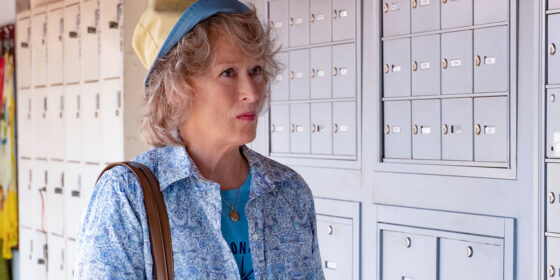The Laundromat (Steven Soderbergh, US) — Special Presentations

By Mark Asch
“Follow the money” is the imperative of every Steven Soderbergh movie: since Traffic helped inaugurate the “everything is connected” genre, he’s tracked the flow of circulating commodities from viruses to athletes, and his heist films invert the find-the-lady deceptiveness of global finance to redistributive ends. The Laudromat, his Panama Papers movie, aims for the razzle-dazzle glibness and movie-star misdirection of the Ocean’s trilogy. As the real-life shell-company impresarios Mossack and Fonseca, Gary Oldman (doing an ’Allo ’Allo! German accent) and Antonio Banderas wander around greenscreen backdrops in Liberace evening jackets, suavely rationalizing inequality and theorizing on the concept of money at its most abstract. These abstractions are fleshed out via threads from Jake Bernstein’s nonfiction book Secrecy World, in a series of brightly lit, broadly acted globetrotting vignettes. An ostensibly liberal-universalist network narrative which turns out to be largely fuelled by racial caricature, The Laundromat is Soderbergh’s Cloud Atlas.
In 2005, the tour boat Ethan Allen sank on Lake George in upstate New York—swamped, the film implies, by the wake of a much larger vessel. It left 20 Midwestern tourists dead, and embroiled their surviving relatives in an insurance scam complicated by shell companies registered to PO boxes in the Carribean. The Laundromat adds a 21st victim: the husband (James Cromwell) of Ellen Martin (Meryl Streep), who is eulogized by his small-town pastor as the emblematic “common man,” the kind of salt-of-the-earth type who makes the world go ‘round by loving his wife and paying his taxes. Streep gives Ellen a touchingly small voice to go with her sensible shoes, middle-of-the-road celebrity worship, and wine-mom sense of humour: she is obviously “The Meek” whose promised inheritance of the earth is referenced throughout Scott Z. Burns’ script.
Ellen’s aw-shucks realizations about the realities of one-percenter tax avoidance are dramatized by a series of anecdotes about decadent rich assholes. Soderbergh aims for punchy populism, and ends up making a movie more cartoonish than his most recent iPhone fisheye dramas (including the very Looney Tunes death of a Mossack Fonseca cubicle drone). Fraud is committed by in-name-only company director Malthus Boncamper (Jeffrey Wright), a lazy islander whose bigamy rhymes with the philandering of the only other black man with a significant speaking role, Nonso Anozie’s bling-bling African expat. The murder of British lawyer Neil Heywood (here called “Maywood” and played by Matthias Schoenaerts) by the wife of a corrupt, high-ranking Chinese official is shown to be the work of a sinister, silent poisoner, in a sequence which features a gratuitous digression into Falun Gong organ harvesting (the Oriental torture takes place in a morgue where someone has, for some reason, hung the carcasses of several ducks).
Even in the Kaepernick-adjacent High Flying Bird (let alone in Haywire, or Magic Mike, or Girlfriend Experience, or, or, or…), the viewer was motivated to contextualize the narrative by activating her knowledge of larger economic superstructures; in The Laundromat, by contrast, you can fall back on platitudes about “men hiding behind pieces of paper,” and their responsibility for “every school without books.” The film ends with the reveal of Streep’s dual role: she slips out of brownface, and then out of her middle-American drag, to deliver a #resistance manifesto in her real movie-star voice.


